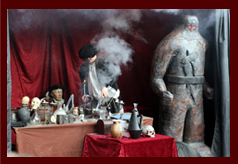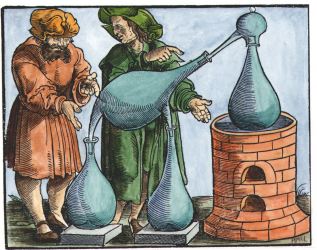| Author | Post |
|---|
Paul Ferguson
Member

| Joined: | Fri Feb 15th, 2008 |
| Location: | |
| Posts: | 1538 |
| Status: |
Offline
|
|
Posted: Sat Dec 27th, 2008 06:16 pm |
|
Gabricus and Beya are the royal brother and sister mentioned in the "Visio Arislei", apparently a translation of the Arabic "Risalat madd al-ba hr dhat al-ru'ya", which was itself a translation from the Greek of Archelaos. As a symbol of the conjunctio CG Jung made use of it in his "Psychology and Alchemy" and elsewhere.
Bonacina refers to this legend, but calls the sister Weia (presumably pronounced Vehya) and not Beya (see below). Does anyone have any suggestions as to why Bonacina should have adopted this variant spelling?Attached Image (viewed 1116 times):
 Last edited on Sat Dec 27th, 2008 06:34 pm by Paul Ferguson
|
Paul Ferguson
Member

| Joined: | Fri Feb 15th, 2008 |
| Location: | |
| Posts: | 1538 |
| Status: |
Offline
|
|
Posted: Sun Dec 28th, 2008 10:54 pm |
|
Incidentally, a room at the castle in Moravská Třebová, where Bonacina worked as personal physician and astrologer to Ladislav Welen von Zerotein, has now been rigged out as "Master Bonacina's Alchemical Laboratory":
http://www.zamekmoravskatrebova.cz/index.php?id=16
Does not look entirely serious...Attached Image (viewed 1175 times):

|
Neil J Mann
Member
| Joined: | Thu Feb 14th, 2008 |
| Location: | |
| Posts: | 15 |
| Status: |
Offline
|
|
Posted: Fri Feb 6th, 2009 01:17 pm |
|
Do we have any idea what Bonacina's direct source might have been? B and V have been somewhat liable to interchange in Spanish, and a few of the variations have solidified so that the Duke of Alba is known in England as the Duke of Alva for instance. A translation of the Arabic made in Spain might well turn Beia into Veia, but this is pure speculation.
|
Paul Ferguson
Member

| Joined: | Fri Feb 15th, 2008 |
| Location: | |
| Posts: | 1538 |
| Status: |
Offline
|
|
Posted: Fri Feb 6th, 2009 01:44 pm |
|
Neil J Mann wrote:
Do we have any idea what Bonacina's direct source might have been? B and V have been somewhat liable to interchange in Spanish, and a few of the variations have solidified so that the Duke of Alba is known in England as the Duke of Alva for instance. A translation of the Arabic made in Spain might well turn Beia into Veia, but this is pure speculation.
Yes, the Spanish call it 'betacismo'. I am not aware of any translations of the Visio into Spanish or Catalan (the latter would be the more likely of the two). Maybe Adam can confirm this.
Having completed the translation I get the impression that Bonacina was far from his books and may have been working from his (not entirely reliable) memory.
Paul
|
adammclean
Member

| Joined: | Fri Sep 14th, 2007 |
| Location: | United Kingdom |
| Posts: | 606 |
| Status: |
Offline
|
|
Posted: Thu May 6th, 2010 02:16 pm |
|
A correspondent wrote to me today on this matter :
Concerning the b and the v-question on your forum (Alva or Alba, Beya or Veya): In Spanish 'b' (be larga) and 'v' (be corta) are pronounced exactly alike. Which may be the cause of different interpretations.
|
Paul Ferguson
Member

| Joined: | Fri Feb 15th, 2008 |
| Location: | |
| Posts: | 1538 |
| Status: |
Offline
|
|
Posted: Thu May 6th, 2010 07:19 pm |
|
adammclean wrote:
A correspondent wrote to me today on this matter :
Concerning the b and the v-question on your forum (Alva or Alba, Beya or Veya): In Spanish 'b' (be larga) and 'v' (be corta) are pronounced exactly alike. Which may be the cause of different interpretations.
Sees to go back a long way and to occur in other languages:
http://es.wikipedia.org/wiki/Betacismo
http://www.raco.cat/index.php/Faventia/article/viewFile/50150/55554
|

Current time is 09:40 am | |
|

